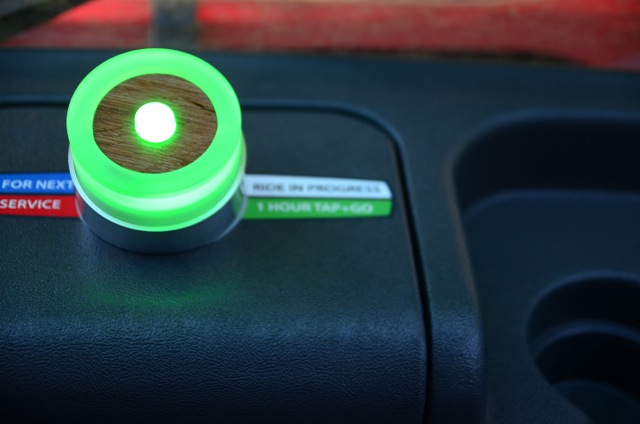The US is home to more than 250 million registered passenger vehicles, making it the largest market for cars and trucks in the world. Of these vehicles, how many are under-used? Left to wallow in dark garages or gather dust in lonely parking lots? I do not have numbers on this, but I do know that a startup called Local Motion is working to give these cars their chance around the block.
[aditude-amp id="flyingcarpet" targeting='{"env":"staging","page_type":"article","post_id":567982,"post_type":"story","post_chan":"none","tags":null,"ai":false,"category":"none","all_categories":"entrepreneur,mobile,","session":"C"}']Local Motion is the first company to graduate from the Lemnos Labs hardware incubator program. The startup manufactures a module that can be installed in any vehicle to make it more shareable. Corporations, university campuses, and municipalities often have fleets of vehicles available for their employees’ use, but do not manage these fleets in the most cost-effective or convenient way. Local Motion’s “employee mobility programs” makes vehicle sharing more efficient.
“We are trying to build better transportation networks,” said cofounder Clement Gires. “There are 2 million cars in the U.S. in fleets and those cars are meant to be shared, but the existing infrastructure is not as efficient as it should be. We provide a smarter link between the infrastructure on the ground and the people”
AI Weekly
The must-read newsletter for AI and Big Data industry written by Khari Johnson, Kyle Wiggers, and Seth Colaner.
Included with VentureBeat Insider and VentureBeat VIP memberships.
The technology not only replaces keys, but also transmits and collects data. Users can see available vehicles from their smart phone and hold one for immediate use. When they arrive at the parking lot (or wherever), a little light indicates the appropriate bike, car, or scooter, and it can be accessed by swiping an employee badge. GPS, accelerometer, and other monitoring technology tracks where the vehicles are and their “health status.”
“We are trying to leverage all the data collected in field,” Gires said. “How long are the vehicles moving? Where are people going? How many times a day do people take them out? How many people are on board every trip? We use this data to understand and anticipate mobility patterns at different times of day, and tell companies where to distribute their cars, what types of vehicles to have, and how many. This will save businesses a lot of money.”
Local Motion began deploying the technology two months ago at the Google campus in Mountain View, which has 150 electric vehicles and 2,000 bicycles in its fleet. The team is also targeting universities like Standard, which has 400 small electric vehicles and 1500 cars, and other large, local corporations. Ultimately, the vision is to install the technology in the vehicles at the manufacturing stage.
When Gires and his cofounder John Stanfield first started out, they were working on accreting “the most shareable vehicle ever.” However, they realized that instead of adding more vehicles to the equation, they could have a greater impact by optimizing the vehicles that are already in the market.
Local Motion was the first company Lemnos Labs invested in, and for a while, the 4-wheel, 4-seater electric golf cart lived in the incubator’s warehouse and shared work space in SOMA. Since officially opening its doors earlier this year, Lemnos has added 9 hardware startups to its portfolio. After developing the product and successfully raising a $1 million seed round, Local Motion has moved on to its own work space in Burlingame.
Lemnos Labs was founded by Jeremy Conrad and Helen Zelmen, two MIT grads who made the pilgrimage to Silicon Valley to found a startup. They were interested in creating a hardware company, but saw that there was not a firm ecosystem in place to support them. Instead of starting their own company, they chose to nurture others.
[aditude-amp id="medium1" targeting='{"env":"staging","page_type":"article","post_id":567982,"post_type":"story","post_chan":"none","tags":null,"ai":false,"category":"none","all_categories":"entrepreneur,mobile,","session":"C"}']
Participants in Lemnos labs receive warehouse space, access to prototyping and testing facilities, and equipment including a full electrical bench, irons, a light machine, drill press, a grinder etc… They also have access to legal services, introductions to suppliers, mentorship, design reviews, and guest speakers, as well as an investor network.
Even though the overhead expenses can be higher for hardware companies than software companies, Conrad said there is greg excitement surrounding the potential of these companies and platforms like Kickstarter are making it easier to bring a hardware product to market.
“Hardware matters because there are a lot of problems that can’t be addressed on the software side,” Conrad said. “We happen to live in the physical world, it will never go away. That is why we are passionate about this. The perception may be that is is too hard, but there has been a radical shift in the past 10 years of what it takes to get a hardware company of the ground. These companies are showing us what they can do.”
To be accepted into the program, a startup must demonstrate that it has a manufacturable, scaleable product with real-world applications. The goal is to give startups the resources to prove their concepts, create a working prototype, or sell production hardware. Basically, to make enough progress to raise funding and venture out on their own.
[aditude-amp id="medium2" targeting='{"env":"staging","page_type":"article","post_id":567982,"post_type":"story","post_chan":"none","tags":null,"ai":false,"category":"none","all_categories":"entrepreneur,mobile,","session":"C"}']
Now that they have raised a seed round, Local Motion intends to expand the product and deliver it more broadly. Gires said he would like to get 10 big, local customers in the next year with more than 50 cars each. This initial investment came from Tim Draper of Draper Associates, Jerry Yang of Ame Cloud Ventures, Ash Patel of Morado Ventures, and Tony Hsieh from the The Vegas Tech Fund.
VentureBeat's mission is to be a digital town square for technical decision-makers to gain knowledge about transformative enterprise technology and transact. Learn More

